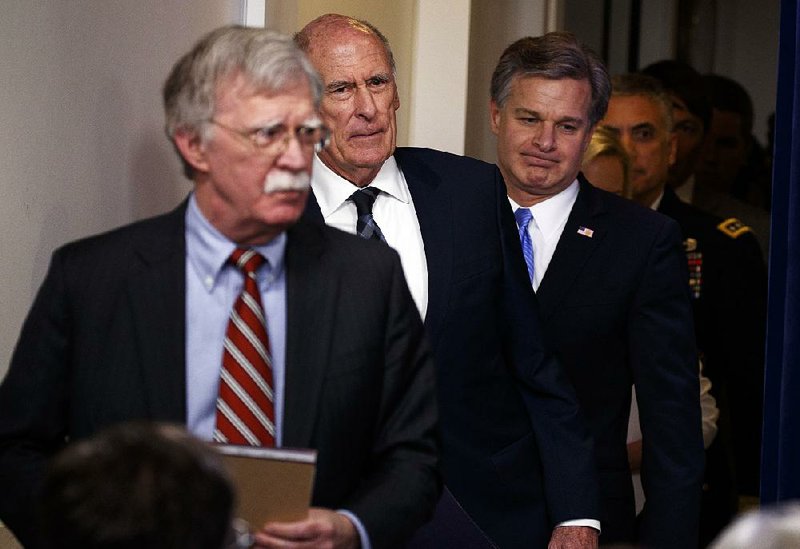Top national security officials made a rare appearance in the White House briefing room Thursday to warn that Russia continues to target U.S. elections and to outline what is being done to combat the interference.
"In regards to Russian involvement in the midterm elections, we continue to see a pervasive messaging campaign by Russia to try to weaken and divide the United States," Director of National Intelligence Dan Coats said. "We know there are others who have the capability and may be considering influence activities."
The joint appearance by Coats, Secretary of Homeland Security Kirstjen Nielsen, national security adviser John Bolton, FBI Director Christopher Wray and National Security Agency Director Paul Nakasone comes as the administration is facing criticism over its efforts to deal with election interference and continuing questions over how seriously President Donald Trump takes the threat.
Lawmakers and independent analysts say that voting systems are more secure against hackers, thanks to action at the federal and state levels, and that the Russians have not targeted those systems to the degree they did in 2016.
But Russian efforts to manipulate U.S. voters through misleading social media postings are likely to have grown more sophisticated and harder to detect, and there is not a sufficiently strong government strategy to combat information warfare against the U.S., outside experts warn.
Thursday's news conference was the first time that the heads of the intelligence and law enforcement agencies with a role in preventing election interference have appeared together to address the threat. It follows a meeting last week of the National Security Council on election security, the first Trump has led on the matter, which lasted less than an hour and produced no new orders on how to counter or deter the interference.
The officials described Russian actions observed to date as significant but not as multifaceted as what intelligence agencies saw during the 2016 campaign.
"We are not yet seeing the same kinds of efforts to specifically target election infrastructure" as in 2016, Wray said, referring to Russian penetration of voter rolls and other efforts to attack the machinery that collects and tabulates vote counts.
"What we are seeing are the malign influence operations," he said, which has played out in propaganda efforts on social media that Wray called "information warfare."
But Nielsen said U.S. agencies have "seen a willingness and a capability on the part of the Russians" to attack U.S. election infrastructure.
Coats said Russian activity in preparation for the midterms "is not the kind of robust campaign" the country conducted two years ago.
He said the Russians "are looking for every opportunity, regardless of party," to disrupt U.S. elections.
Wray added that Russian and other foreign actors are trying to suppress voting, provide illegal campaign funding and carry out cyberattacks.
"This is not just an election cycle threat," Wray said. "Our adversaries are attempting to undermine our country" on a persistent basis.
Nakasone, who is also the commander of the U.S. Cyber Command, said the command and the National Security Agency are both tracking a wide range of foreign cyber adversaries and "are prepared to conduct operations against those actors attempting to undermine our nation's midterm elections."
Nakasone did not divulge details of the U.S. cyber playbook or say what U.S. responses might have already taken place, saying the operations are sensitive and require confidentiality to achieve success.
REACTION IN ARKANSAS
In Arkansas, state party spokesmen said they're aware of the election security issue.
"We have a state-of-the-art firewall," said Republican Party of Arkansas spokesman Stephen Houserman. "I think the party is in a really good place. We take security seriously here."
"All of our Democratic candidates in Arkansas go through a rigorous [Democratic National Committee] facilitated training," said Democratic Party of Arkansas spokesman Reed Brewer.
Arkansas congressional campaigns expressed confidence in their existing security measures.
"We've not had any issues that I'm aware of," said Beau Walker, campaign manager for U.S. Rep. Steve Womack, the Rogers Republican representing Arkansas' 3rd Congressional District.
Josh Mahony, the Fayetteville Democrat seeking to unseat Womack, has also avoided problems.
"We have not experienced any campaign hacking or online security breaches," Mahony campaign spokesman Michael Cook said.
Other campaigns are also expressing confidence.
"We haven't had any incidents so far," said Darbie Kuykendall, campaign manager for U.S. Rep. Bruce Westerman of Hot Springs, the Republican incumbent in the 4th District.
"To my knowledge, we have not been targeted by hackers but treat every day as though the threat of hacking is imminent," said Graham Senor, a spokesman for state Rep. Clarke Tucker, the Little Rock Democrat who is running for Congress in the 2nd Congressional District.
"We agree with the US intelligence communities and take the potential for hacking -- Russian or otherwise -- very seriously," Senor said in an email. "In our efforts to proactively combat the threat of interference, The Clarke Tucker campaign uses multi-factor authentication; we have been trained on avoiding phishing attacks; and we require each device connected to the internet to have the latest software updates installed. We also encourage the use of random and frequently-changed passwords."
Jonah Shumate, spokesmen for U.S. Rep. Rick Crawford, said the campaign hasn't had any known security issues.
"Our site is hosted along with quite a few others on a single server. Of the whole that are hosted there, some have had some security issues associated with them but we have not," he said.
Matt Ling, a spokesman for 1st Congressional District candidate Chintan Desai, said the Helena-West Helena Democrat is aware of the potential for problems.
"We do worry about it," Ling said.
"We're doing training. We've got guidelines about online security," he added.
One staff member did receive electronic texts that looked fraudulent, but there's no evidence the scammer was targeting the campaign, he said.
"I do think we're not a high-priority target for Russians," he said.
BOLTON RESPONDS
The officials' message at the White House briefing Thursday was strikingly different from comments Trump had made in the past. During a news conference in Helsinki last month after a meeting with President Vladimir Putin of Russia, Trump did not discuss election interference.
Bolton said the president did raise the issue of meddling with Putin at their meeting, and he defended what he said had been the president's intense focus on the issue since he was inaugurated in January 2017.
"I think the president has made it abundantly clear to everybody" in the government who oversees election security, Bolton said, that "he cares deeply about it and that he expects them to do their jobs."
Bolton said he had responded to a letter from five Democratic lawmakers asking for details about what the Trump administration was doing to prevent Russia and other foreign adversaries from interfering in the midterm elections.
Bolton in his response to the senators cited U.S. sanctions on Russian oligarchs and individuals indicted for election interference and the expulsion of Russian intelligence agents from the U.S. after the nerve-agent poisoning of a Russian exile and three others in the U.K.
Controversy over Trump's messages on Russian election interference has renewed calls for additional sanctions on the Putin government.
A bipartisan group of senators introduced legislation to impose new sanctions on Russia for interfering in U.S. elections, including penalties affecting Russian sovereign debt and energy projects, and requiring a report on Putin's assets and net worth.
Republican Sen. Lindsey Graham of South Carolina said in a statement Thursday that the senators' goal is to "impose crushing sanctions and other measures against Putin's Russia until he ceases and desists meddling in the U.S. electoral process," stops cyberattacks and removes Russia from Ukraine.
Democratic Sen. Bob Menendez of New Jersey said the measure is the "next step in tightening the screws on the Kremlin" so Putin understands "that the U.S. will not tolerate his behavior any longer."
The measure also would impose new sanctions on oligarchs and political figures who aid corrupt activities on Putin's behalf, and require the State Department to determine whether Russia should be designated as a state sponsor of terrorism.
The co-sponsors are three Republicans, including Arizona's John McCain, and three Democrats.
A separate measure proposed by Republican Sen. Marco Rubio of Florida and Democrat Chris Van Hollen of Maryland has been mentioned by Senate Majority Leader Mitch McConnell of Kentucky as a possible vehicle for retaliating against continued Russian interference in U.S. elections. That bill would impose stiff sanctions including on the energy and financial sectors if Coats determines Russia is continuing to interfere.
Information for this article was contributed by Shane Harris, Felicia Sonmez, Karoun Demirjian, Ellen Nakashima and Craig Timberg of The Washington Post; by Steven T. Dennis, Alex Nicholson, Artyom Danielyan and Toluse Olorunnipa of Bloomberg News; by Zeke Miller, Deb Riechmann, Colleen Long and Lisa Mascaro of The Associated Press; by Michael D. Shear of The New York Times; and by Frank E. Lockwood of the Arkansas-Democrat-Gazette.
A Section on 08/03/2018

